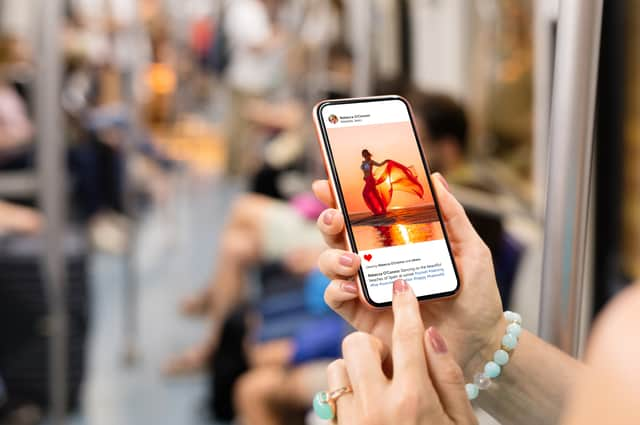Influencers could be required to add disclaimer logo to edited images of their bodies


An MP is calling for new legislation requiring social media influencers to display a warning logo on digitally altered photos.
Former GP Dr Luke Evans, now a Conservative MP for Hinckley and Bosworth, hopes to introduce the new bill to tackle the increasing numbers of eating disorders and body confidence issues.
Advertisement
Hide AdAdvertisement
Hide AdAn estimated 1.25 million people in the UK suffer from anorexia or bulimia, and more than one million use steroids or image-enhancing drugs.
What is the proposed new bill?
The Digitally Altered Body Image Bill will require advertisers, broadcasters and publishers to display a logo in cases where an image of someone or a part of their body has been edited.
On Wednesday (12 January) the MP introduced the proposed bill in parliament as a 10-minute rule bill. They often do not get through the first stage but it is a good chance to raise the profile and see how much support it could gain.
The bill aims to tackle unhealthy and unrealistic deceptions of the way we look, which has been driven by digitally enhanced and altered social media photos from influencers, which have a range of consequences on body confidence and physical and mental health.
Advertisement
Hide AdAdvertisement
Hide AdThe warning logo would be similar to the ‘P’ symbol for product placement which is seen on commercial television in the UK.
If the bill was passed, the Advertising Standards Authority (ASA) would develop specific guidelines on how the disclaimer would look, where it would be placed and what would qualify as ‘edited’ or ‘commercial purpose’.
Why is the bill important?
Dr Evans told Sky News of the hugely negative impact digitally altered images of social media influencers are having on people.
He said: "When I was a GP, particularly young women with eating disorders would talk about the fact they’re driven by these images and think they need to have a perfect physique.
Advertisement
Hide AdAdvertisement
Hide Ad"But you started seeing it from men, often talented sportsmen who wanted to get bigger, to look buff on the beach, so they’d start overtraining and taking unsolicited supplements but then they find themselves banned from sport because they’ve tested positive for steroids just because they thought they didn’t ‘look right’.
"One of the biggest things I’m concerned about is people are trying to respond to an image that they can never actually get to,” he added.
Dr Evans concluded the overall problem is that “if you doctor your image, make your biceps bigger, your waist slimmer - and there are multiple images reproduced across social media - the problem is you’re creating a perception that no matter what you do, when you go to the gym, no matter how good your diet is, you are never going to be able to reproduce that.”
He said: "If you saw that person in real life the next day that body would be very different to the one they’re claiming to have - that’s my big concern.
Advertisement
Hide AdAdvertisement
Hide Ad“I’ve got no problem with people aspiring to be fit and healthy, but not in a warped sense that we can never achieve."
What has the effect been on mental health issues?
A government inquiry into body image last year found concerns about the way people look now "start younger, last longer, and affect more people than ever before".
A Girlguiding survey found that 61% of adults and 66% of children feel negative, or very negative, about their body image "most of the time".
The same survey found that 51% of 7-10 year old girls feel "very happy" with how they look, but by age 11-16, when most start to use social media, this drops to just 16%.
Advertisement
Hide AdAdvertisement
Hide AdIn 2017, 88% of girls aged 11-21 said they wanted adverts that had been airbrushed to be upfront and say so.
Eating disorders and body dysmorphia have risen during the pandemic after already increasing in the years before.
NHS Digital data for England shows from April to October 2021 - the most recent data - there were 4,238 admissions, 41% more for children aged 17 and under than the same period the year before.
What has been said?
Dr Evans said this bill is the start of a “very small part” of the wider societal and cultural issues facing people.
Advertisement
Hide AdAdvertisement
Hide Ad"But if it gets made law it will be a realisation that something needs to change in society because this issue is not going away," he said.
Tom Quinn, from the eating disorder charity Beat, praises Dr Evans for raising awareness of "unrealistic body standards".
The charity’s support service experienced a 300% increase in demand over the pandemic.
Mr Quinn told Sky News: "Whilst social media would not be the sole cause of an eating disorder developing, from the people we support we know that pressures to look a certain way can lower self-esteem and confidence.
Advertisement
Hide AdAdvertisement
Hide Ad"Being exposed to unrealistic body shapes and sizes online can also serve as ‘inspiration’ to engage in eating disorder behaviours and become more unwell."
Will the Government back the bill?
According to Dr Evans, MPs from all parties have told him they are in support of his bill. However, it is not clear yet whether the bill will receive Government approval.
He said politicians from countries such as Norway and the US have got in contact saying they want to bring in a similar bill.